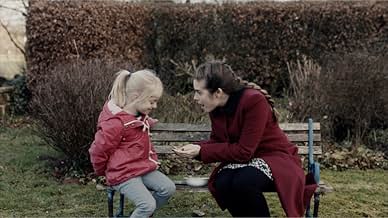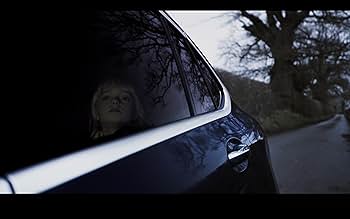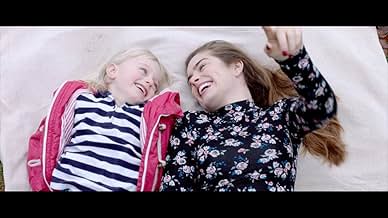IMDb-BEWERTUNG
7,7/10
3144
IHRE BEWERTUNG
Füge eine Handlung in deiner Sprache hinzuA deaf 6-year-old girl named Libby lives in a world of silence until a caring social worker teaches her to use sign language to communicate.A deaf 6-year-old girl named Libby lives in a world of silence until a caring social worker teaches her to use sign language to communicate.A deaf 6-year-old girl named Libby lives in a world of silence until a caring social worker teaches her to use sign language to communicate.
- 1 Oscar gewonnen
- 25 Gewinne & 8 Nominierungen insgesamt
Empfohlene Bewertungen
I must admit up front that I am not at all impartial in my ability to review "The Silent Child". Because I am the parent of a deaf daughter and am very acquainted with the subject matter in the film, the picture had a HUGE impact on me and I found myself crying during portions of the short. Even if perhaps I am not 100% impartial, the film earned a nomination for Best Live Action Short from the Oscars and I am rooting for it to take home the statuette--because of the quality of the film and because its message needs to be spread far and wide.
The story is about a cute little girl named Libby who lives in England. Her family is very well off and Libby is about to begin school. However, there is a problem...Libby is profoundly deaf. Because of this, a social worker has been assigned to work with the child. Soon it becomes apparent that the family (the mother in particular) want some miracle to occur...for Libby to hear and talk, though this just is very very unlikely. Plus, with the family refusing to learn sign language and just hoping all works out, things look pretty bad for Libby...even after she begins to blossom and open up during the time she works with the social worker.
The themes of this short are how woefully inadequate the school systems are to handle the needs of a deaf child and well as how woefully inadequate many parents of deaf kids are to be parents. Everything I saw in the film seemed familiar to me...such as the fact that the vast majority of deaf kids have parents who never learn to communicate with them and how isolated deaf children can be. While the problem in the US is not quite as severe as it is in the UK (here we have generally had little difficulty getting interpreters and other assistance with our daughter due to her disability), it still hits quite close to home. And, like Libby's family, I've known families who simply refuse to do anything to admit that their child needs remediation.
Overall, extremely well made, insightful and sad in many, many ways.
The story is about a cute little girl named Libby who lives in England. Her family is very well off and Libby is about to begin school. However, there is a problem...Libby is profoundly deaf. Because of this, a social worker has been assigned to work with the child. Soon it becomes apparent that the family (the mother in particular) want some miracle to occur...for Libby to hear and talk, though this just is very very unlikely. Plus, with the family refusing to learn sign language and just hoping all works out, things look pretty bad for Libby...even after she begins to blossom and open up during the time she works with the social worker.
The themes of this short are how woefully inadequate the school systems are to handle the needs of a deaf child and well as how woefully inadequate many parents of deaf kids are to be parents. Everything I saw in the film seemed familiar to me...such as the fact that the vast majority of deaf kids have parents who never learn to communicate with them and how isolated deaf children can be. While the problem in the US is not quite as severe as it is in the UK (here we have generally had little difficulty getting interpreters and other assistance with our daughter due to her disability), it still hits quite close to home. And, like Libby's family, I've known families who simply refuse to do anything to admit that their child needs remediation.
Overall, extremely well made, insightful and sad in many, many ways.
What a wonderfully made and beautiful movie. I am a 38 year old male reduced to tears within minutes. Well done on bringing awareness in such a beautiful way. Can't stop thinking about the movie.
I watched this in a sign language class at my college. I've always wanted to communicate well with deaf people and this film shows why that is so important.
The feelings of loneliness expressed by the young actress are true to life. Many deaf ones cannot communicate with the general public, not because they don't want to, but because no one understands them. This film captures that and provides a powerful message why we need to try harder to include the deaf community by trying to communicate with them. The Silent Child is an amazing and emotional film that needs to be seen. It's realism is outstanding and it's message compelling. Thoroughly deserved the Oscar.
The feelings of loneliness expressed by the young actress are true to life. Many deaf ones cannot communicate with the general public, not because they don't want to, but because no one understands them. This film captures that and provides a powerful message why we need to try harder to include the deaf community by trying to communicate with them. The Silent Child is an amazing and emotional film that needs to be seen. It's realism is outstanding and it's message compelling. Thoroughly deserved the Oscar.
Introduction: The short film The Silent Child (2017), 20m, a brilliant low budget film ($10k) made by Chris Overton, with a pleasant play and a fantastic multi-layered screenplay of Rachel Shenton, great cinematography by Ali Farahani, and impressive music composed by Amir Konjani, was truly deserved to achieve the title of the best short film at the Oscars 2018.
Plot theme: The theme of the first layer of the film can be seen as a detailed and pathological approach to the problems of deaf or hard-of-hearing children. Only the very same sentence that Joanna hears from Paul that the reason why she was called to this house, hasn't been to understand Libby but to help Sue feel more comfortable in controlling affairs, can represent the depth of the problem of these children. The filmmaker plays his impressive role well by presenting brief but tragic statistics in the end credits of the film. Although this layer of the film is capable of a detailed critique of the exact details of the plot, cinematography, and music of the film, I prefer to have a metatextual look at the symbolic theme (second layer) of the movie in my short opportunity because it may be in shadows and less visible.
Meta-textual layer: In my view, this film with its elaborate use of symbols and characters, expresses another story of reason in opposition with love, and warns against the fall of the meaning of life and the tragedy of forgetting love! Some of these used symbols are:
The mother as the motherland, procreation, and affairs of sensory including reason. She is an entire and full-time controller who is very willing to turn anything into her own language and logic, in order to master it. With this ignorance, she misses the opportunities in front of her to accept the special language of love (Libby) and enjoy this tenderness, and even considers the messenger of this truth (Joanna) as a disturbing threat.
The deaf child (Libby) as the element of Love, the innocent child that is silent from speech but susceptible to miracles, she is from an unknown lineage and the result of the bond of odd but alien love!
The helper girl in red (Joanna) as an element of femininity, who understands love and finds it (Libby) easily behind every tree while the closest members of her family are unable to understand her.
The family and society as ego and superego, a language structure powered by laws and ideals, but just bring busyness and coldness of daily routine, and its members only seek to weaken the other and acquire a position of greater power and control.
Sign-language as a symbol of the intuitive love language.
The school, a symbol of prison show which imposes a dictatorial regime on its captives to restrain love and homogenize all members of the society of the modern world.
The filmmaker has depicted the presence and absence of love on the roads of Joanna's route with sensory and visual presentation, and the audience subconsciously finds the atmosphere of the movie foggy or clear in accordance with hiding or finding love during the story. It can be seen that all the names of the story have been chosen very carefully according to the mentioned symbols. By reflecting on the roots and the origins of the names of the characters such as Libby, Joanna, Sue and Paul can find the deep connection of these choices in the role of the types of the story. This approach even leads us to the third and more sublime layer of the film's theme, which is not possible in this review.
A thought-provoking open-end: The intelligent and brilliant open-end in the film after the romantic display of expressing love between Libby and Joanna from behind the bars of the school (the prison) raises this question for the audience: What will the end be like? Do you really want to know what happens to Libby? Will this remain a full-blown tragedy? The answer is up to you, it depends on what you will do to free up your Libby...
Plot theme: The theme of the first layer of the film can be seen as a detailed and pathological approach to the problems of deaf or hard-of-hearing children. Only the very same sentence that Joanna hears from Paul that the reason why she was called to this house, hasn't been to understand Libby but to help Sue feel more comfortable in controlling affairs, can represent the depth of the problem of these children. The filmmaker plays his impressive role well by presenting brief but tragic statistics in the end credits of the film. Although this layer of the film is capable of a detailed critique of the exact details of the plot, cinematography, and music of the film, I prefer to have a metatextual look at the symbolic theme (second layer) of the movie in my short opportunity because it may be in shadows and less visible.
Meta-textual layer: In my view, this film with its elaborate use of symbols and characters, expresses another story of reason in opposition with love, and warns against the fall of the meaning of life and the tragedy of forgetting love! Some of these used symbols are:
The mother as the motherland, procreation, and affairs of sensory including reason. She is an entire and full-time controller who is very willing to turn anything into her own language and logic, in order to master it. With this ignorance, she misses the opportunities in front of her to accept the special language of love (Libby) and enjoy this tenderness, and even considers the messenger of this truth (Joanna) as a disturbing threat.
The deaf child (Libby) as the element of Love, the innocent child that is silent from speech but susceptible to miracles, she is from an unknown lineage and the result of the bond of odd but alien love!
The helper girl in red (Joanna) as an element of femininity, who understands love and finds it (Libby) easily behind every tree while the closest members of her family are unable to understand her.
The family and society as ego and superego, a language structure powered by laws and ideals, but just bring busyness and coldness of daily routine, and its members only seek to weaken the other and acquire a position of greater power and control.
Sign-language as a symbol of the intuitive love language.
The school, a symbol of prison show which imposes a dictatorial regime on its captives to restrain love and homogenize all members of the society of the modern world.
The filmmaker has depicted the presence and absence of love on the roads of Joanna's route with sensory and visual presentation, and the audience subconsciously finds the atmosphere of the movie foggy or clear in accordance with hiding or finding love during the story. It can be seen that all the names of the story have been chosen very carefully according to the mentioned symbols. By reflecting on the roots and the origins of the names of the characters such as Libby, Joanna, Sue and Paul can find the deep connection of these choices in the role of the types of the story. This approach even leads us to the third and more sublime layer of the film's theme, which is not possible in this review.
A thought-provoking open-end: The intelligent and brilliant open-end in the film after the romantic display of expressing love between Libby and Joanna from behind the bars of the school (the prison) raises this question for the audience: What will the end be like? Do you really want to know what happens to Libby? Will this remain a full-blown tragedy? The answer is up to you, it depends on what you will do to free up your Libby...
"The Silent Child," Chris Overton, Rachel Shenton - A beautiful film with an important message about how deaf children need support and assistance in life and in school in order to develop fully to their potential, and the serious negative consequences that lack of support can have. I found this film to be quite touching. Beautifully directed, acting was phenomenal. Rachel Shenton should be a star. This is my personal pick for the live-action short film Oscar.
Wusstest du schon
- WissenswertesRachael Shenton signed along with her Academy Award acceptance speech (using British Sign Language BSL) after making a promise to her co-star Maisie Sly, that she would do so if they won.
- VerbindungenFeatured in The Oscar Nominated Short Films 2018: Live Action (2018)
Top-Auswahl
Melde dich zum Bewerten an und greife auf die Watchlist für personalisierte Empfehlungen zu.
Details
- Erscheinungsdatum
- Herkunftsland
- Offizielle Standorte
- Sprachen
- Auch bekannt als
- La niña silenciosa
- Drehorte
- Produktionsfirmen
- Weitere beteiligte Unternehmen bei IMDbPro anzeigen
Box Office
- Budget
- 10.000 £ (geschätzt)
- Laufzeit20 Minuten
- Farbe
- Seitenverhältnis
- 2.35 : 1
Zu dieser Seite beitragen
Bearbeitung vorschlagen oder fehlenden Inhalt hinzufügen

Oberste Lücke
By what name was The Silent Child (2017) officially released in Canada in English?
Antwort




















